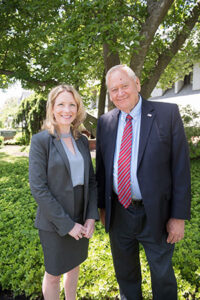
NHLA paralegal and DVAP director, Erin Jasina, with The Honorable Ned Gordon.
New Hampshire scored a significant victory in the mission to close the access to justice gap with the passage of a new pilot program – one of the first of its kind in the country – allowing paraprofessionals to represent clients in court in certain cases. New Hampshire Legal Assistance led legislative efforts on the pilot program’s adoption.
“There is less than one civil legal aid attorney for every 10,000 people with low income in New Hampshire. We have to find new ways of getting civil legal services to people who need them,” said NHLA Executive Director Sarah Mattson Dustin. “Expanding the work that paraprofessionals do is going to be a big part of the solution.”
“This pilot, this experiment, will be one of the most meaningful steps that our state will have taken to address the access to justice issue,” said New Hampshire Supreme Court Chief Justice Gordon MacDonald. “Fewer of our fellow citizens will be there standing alone on a very important day in their life.”
Mattson Dustin and MacDonald both testified in favor of the program in front of the state legislature. Also involved in bringing the program to fruition was Ned Gordon, a retired judge and now a state representative from Bristol who sponsored the bill authorizing the program’s creation.
“As a judge in the Family Division, I frequently saw people unrepresented who unfortunately were not well-served by the system,” he said. “It seemed to me that we need to provide legal services to people who have a great need, particularly where there’s children involved, because it can have an enormous impact on their lives as well.”
The pilot program took effect January 1, 2023. It authorizes paraprofessionals to represent clients in court in certain housing, domestic violence, stalking, and family law cases in the Family and District Divisions for Manchester, Franklin, and Berlin.
The program is available to clients who earn up to 300% of the federal poverty level ($40,770 for a one-person household, $54,930 for a two-person household). Participating paraprofessionals must hold either a bachelor’s degree in any field or an associate’s degree in a law-related field, as well as at least two years of work experience in a law-related setting. They must also work under the supervision of an active attorney.
Erin Jasina, a paraprofessional with NHLA and the director of NHLA’s Domestic Violence Advocacy Project, handled the first case under the program – a final protective order hearing in a Family Division court – in January.
Jasina’s client reported feeling validated and grateful to have an advocate beside her during the hearing. Afterward, the judge invited Jasina to her chamber, and praised her performance.
“She said I did a wonderful job and that she thought this pilot project will help a lot of people in New Hampshire,” said Jasina. “It’s amazing to have judicial support for this project. And I have already had people at trainings with the NH Women’s Bar Association and the NH Paralegal Association asking how they can help out. We want paraprofessionals to feel empowered to do this work, and it’s encouraging to have lawyers supporting us and wanting to see us succeed.”
The next steps of the pilot program hopefully include expanding services offered statewide.
“I give lots of credit to the staff of NHLA for initiating efforts in the program,” Gordon said.
“I am hoping as time passes, people see that it can be successful and more people will agree to participate.”

